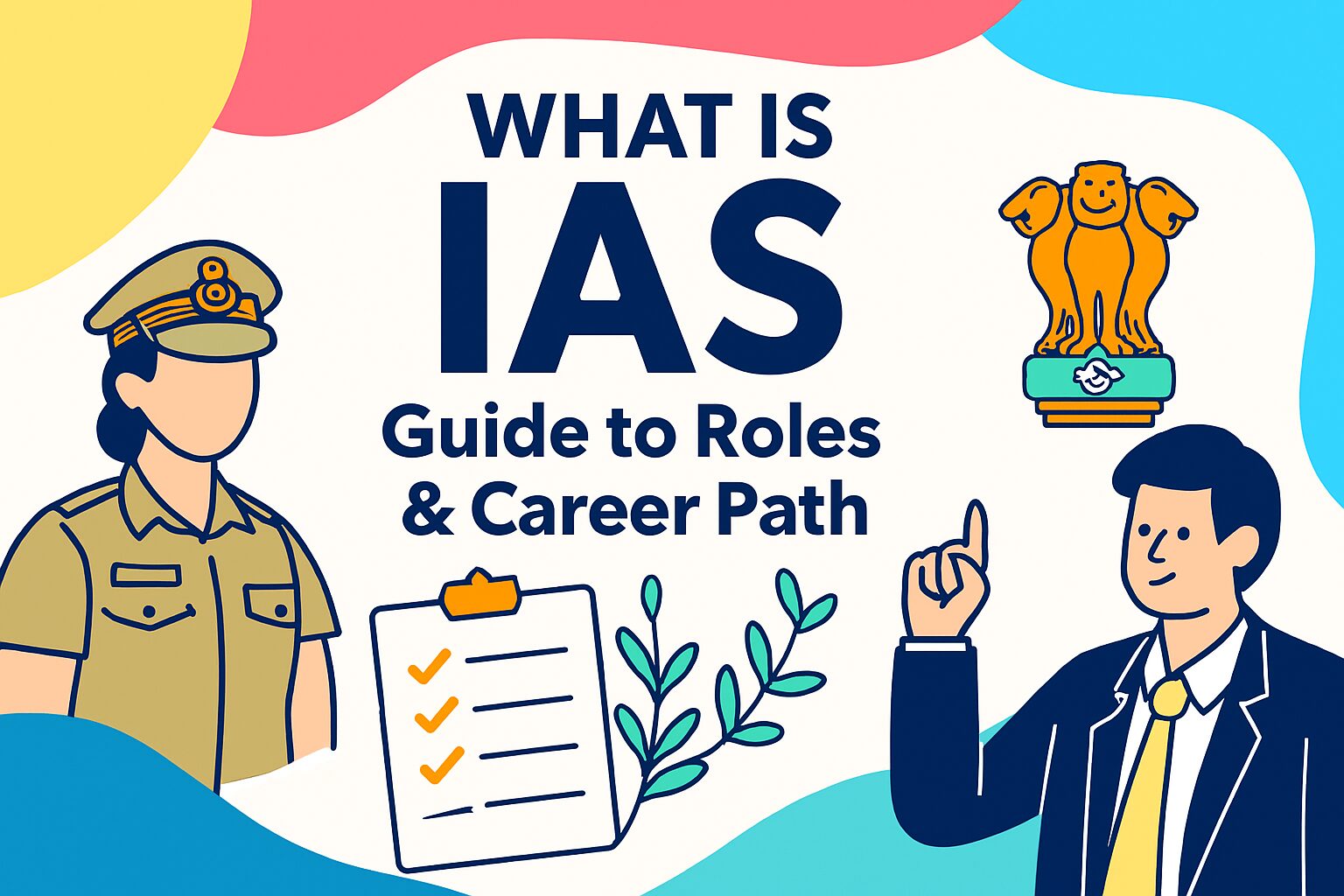Indian Administrative Service Career
The Indian Administrative Service (IAS) stands as the cornerstone of India’s civil service system, offering a prestigious and impactful career in public administration jobs. In 2026, the IAS continues to attract ambitious individuals eager to shape national policies, drive development, and serve the public. As part of the civil service jobs framework, IAS officers hold key roles in governance, from district administration to central policy-making. This guide explores what is IAS, its roles, responsibilities, career path, and how to become an IAS officer, providing a roadmap for aspirants eyeing this elite career in 2026. Whether you’re drawn to government administrative roles or seeking a path to influence India’s future, understanding the Indian Administrative Service is your first step.
Table of Contents
- What Is IAS?
- Roles and Responsibilities of an IAS Officer
- IAS Career Path in 2026
- How to Become an IAS Officer in 2026
- Skills Required for IAS Success
- Benefits and Challenges of an IAS Career
- Tips for IAS Exam Preparation in 2026
- Conclusion: Your Journey to IAS in 2026
- Frequently Asked Questions (FAQs)
- Disclaimer
What Is IAS?
The Indian Administrative Service is one of India’s premier civil services, established under the All India Services Act, 1951. It forms the backbone of the country’s administrative machinery, with officers serving in key government administrative roles at district, state, and central levels. IAS officers are recruited through the highly competitive Civil Services Examination (CSE) conducted by the Union Public Service Commission (UPSC). In 2026, the IAS remains a coveted career due to its prestige, influence, and opportunity to drive social and economic change.
IAS officers are generalists, trained to handle diverse functions, from implementing government schemes to advising ministers. Unlike other civil service jobs, the IAS offers unparalleled authority and responsibility, making it a cornerstone of public administration jobs in India. The service is merit-based, with a focus on neutrality and integrity, ensuring officers serve the public interest above political affiliations.
Roles and Responsibilities of an IAS Officer
IAS officers perform a wide array of duties, adapting to roles that evolve with their career stage and posting. Their work spans civil service jobs that require leadership, decision-making, and coordination with various stakeholders.
District Administration
At the district level, IAS officers often serve as District Collectors or District Magistrates, overseeing governance in a specific region. They manage development programs, maintain law and order, and coordinate disaster response. For example, they supervise schemes like Swachh Bharat or MGNREGA, ensuring effective delivery of public administration jobs. Their role involves liaising with local governments, NGOs, and citizens, balancing administrative and judicial functions.
State and Central Government Roles
In state secretariats, IAS officers draft policies, manage budgets, and oversee departments like education or health. At the central level, they work in ministries, contributing to national policy-making in areas like finance or defense. These government administrative roles demand expertise in coordination and strategic planning, often involving international collaboration, aligning with administrative careers in civil service worldwide.
Policy Formulation and Implementation
IAS officers play a critical role in shaping and executing policies. They analyze data, consult stakeholders, and ensure policies align with national goals, such as sustainable development or digital India. Their work in policy implementation bridges the gap between planning and action, making them pivotal in public administration jobs.
Indian Administrative Service Career Path in 2026
The IAS career path is structured, offering clear progression from entry-level to senior roles. In 2026, the trajectory remains competitive yet rewarding, with opportunities to influence national and global agendas.
Entry-Level Roles
New IAS officers start as Assistant Collectors or Sub-Divisional Magistrates (SDMs), managing sub-districts. They handle land revenue, public grievances, and local projects, gaining hands-on experience in government administrative roles. Salaries at this stage range from ₹56,100 to ₹1,32,000 per month (7th Pay Commission).
Mid-Level Roles
After 5–10 years, officers become District Collectors or Directors in state secretariats, overseeing larger regions or departments. They manage budgets, lead teams, and implement state-level policies. Salaries rise to ₹78,800–₹2,09,200, with additional allowances for civil service jobs.
Senior-Level Roles
Senior IAS officers serve as Secretaries in state or central governments, or as heads of public sector undertakings. They shape national policies, represent India in international forums, and earn ₹1,44,200–₹2,50,000. Some reach the apex as Cabinet Secretary, the highest government administrative role in India.
How to Become an IAS Officer in 2026
Becoming an IAS officer requires rigorous preparation and strategic planning. The process is demanding but achievable with dedication.
Eligibility Criteria
To apply for the UPSC CSE in 2026, candidates must: – Be Indian citizens. – Have completed a bachelor’s degree from an accredited university. – Be aged 21–32 years (relaxations for reserved categories). – Meet attempt limits (6 for general, 9 for OBC, unlimited for SC/ST).
UPSC Civil Services Exam
The UPSC CSE is a three-stage process: 1. Preliminary Exam: Objective tests (GS Paper I and CSAT) to screen candidates. 2. Main Exam: Nine subjective papers, including essay, general studies, and optional subjects. 3. Interview: A personality test assessing communication, leadership, and ethics. In 2026, the exam remains highly competitive, with over 10 lakh applicants for ~1,000 posts.
Training and Probation
Selected candidates undergo training at the Lal Bahadur Shastri National Academy of Administration (LBSNAA) in Mussoorie. The 2-year program includes classroom learning, field visits, and probationary postings, preparing officers for public administration jobs.
Skills Required for IAS Success
Success in Indian Administrative Service roles demands a blend of hard and soft skills: – Analytical Thinking: For policy analysis and problem-solving. – Communication: To engage with diverse stakeholders. – Leadership: To manage teams and drive initiatives. – Ethics and Integrity: To uphold public trust. – Adaptability: To handle diverse postings, from rural districts to international assignments, aligning with administrative careers in civil service worldwide.
Benefits and Challenges of an IAS Career
Benefits: IAS officers enjoy job security, pensions (up to 50% of last salary), and allowances like housing and travel. The role offers prestige, influence, and the chance to impact millions, with 85% reporting high job satisfaction.
Challenges: The job involves long hours, political pressures, and frequent transfers. Rural postings may lack amenities, and high-stakes decisions can be stressful, common in civil service jobs.
Tips for IAS Exam Preparation in 2026
– Start Early: Begin preparation 12–18 months before the exam, focusing on NCERT books and current affairs. – Mock Tests: Practice UPSC prelims and mains papers to build speed and accuracy. – Optional Subject: Choose a subject aligned with your strengths (e.g., Public Administration, Sociology). – Current Affairs: Follow The Hindu, Yojana, and PIB for policy updates. – Coaching: Consider institutes like Vajiram & Ravi or online platforms like Unacademy for structured guidance. For funding studies, explore Government Scholarships Abroad for Indian Students.
Conclusion: Your Journey to IAS in 2026
The Indian Administrative Service offers a transformative career in civil service jobs, blending authority, service, and impact. From district-level governance to shaping national policies, IAS officers drive India’s progress. In 2026, with strategic preparation and dedication, you can join this elite cadre. Explore related fields like High-Paying AI Jobs Without a PhD or academic pathways at the World’s Top 10 Universities 2025 to complement your journey. For insights into other administrative roles, see Administrative Jobs: Roles and Responsibilities Explained and Top In-Demand Administrative Careers for 2026.
Frequently Asked Questions (FAQs)
What is IAS and what do IAS officers do?
The Indian Administrative Service is a premier civil service in India. IAS officers manage district administration, state/central government functions, and policy implementation in public administration jobs.
How competitive is the UPSC exam for IAS in 2026?
Extremely competitive, with over 10 lakh applicants for ~1,000 posts. Success requires rigorous preparation and strategic study.
What qualifications are needed for IAS?
A bachelor’s degree, age 21–32, and Indian citizenship are required. Advanced degrees enhance prospects for civil service jobs.
What is the salary of an IAS officer in 2026?
Salaries range from ₹56,100 (entry-level) to ₹2,50,000 (senior), plus allowances, per the 7th Pay Commission.
Can I become an IAS officer without coaching?
Yes, with self-study, NCERT books, and online resources, though coaching can provide structure for government administrative roles.
What are the benefits of an IAS career?
Job security, pensions, prestige, and the ability to impact society make IAS a top choice among civil service jobs.
What are the challenges of being an Indian Administrative Service officer?
Challenges include long hours, political pressures, frequent transfers, and high-stakes decision-making in public administration jobs.
Where can I find official UPSC exam details?
Visit upsc.gov.in for exam notifications, syllabus, and application details.
Disclaimer
The information in this guide on what is IAS and its career path is for informational purposes only, based on data and trends as of September 22, 2025. Details such as salaries, exam patterns, and eligibility may change. Verify information on official websites like upsc.gov.in before applying. The author and publisher are not responsible for actions taken based on this guide, nor do they guarantee exam success or employment outcomes.



